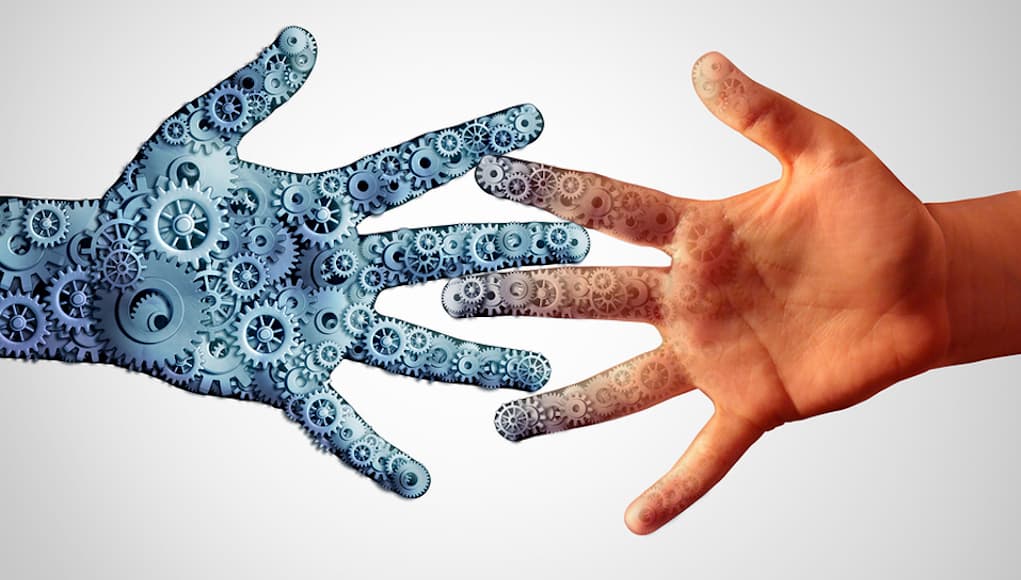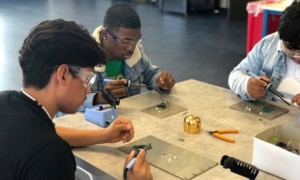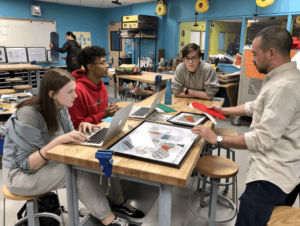Bots & Big Cities: What Do They Mean for Our Kids?

The following post was originally published in April of 2016. Since the piece was originally published less than two years ago, IBM’s Watson has gone beyond a fun PR stunt for AI to a new AI-driven personalized learning platform, and AI continues to proliferate at an ever-increasing rate. Cities and cultures have connected and collided in unimagined ways as the spread of internet connectivity has both enabled meaningful virtual collaboration and cold-war style disinformation campaigns. Blockchain-based “cryptocurrencies” have created and destroyed fortunes on a scale that makes even Enron pale in comparison.
Shortly after this piece was published, Tom wrote about the exponential technology curve, saying “The tools we all use are improving so fast that the rules of the game are being rewritten every day. This is what it feels like to live on a curve of exponential technology where change happens faster than we anticipate—where people that figure out how to ride the connected global cloud-based economy thrive and those that don’t feel left out.”
Our future of work microsite includes eight podcasts and Tom’s Ask About AI report, which concludes that while other countries are building agile responses to the automation economy, it will be American cities that will be the new laboratory of democracy where new education priorities and new family supports will come to life.
We hope the following glance into the recent past will serve as a powerful reminder of why you are working to improve the learning of the students you serve, and lend a sense of urgency to the important work you are doing.
Megacities are shaping life on planet earth. The opportunity to visit schools in southeast Asia this month made visible a new fact: the majority of our seven billion cohabitants now live in cities.
Harvard’s Ed Glaeser argues that cities are the world’s greatest inventions, bringing productivity and opportunity to billions. People all over the world are leaving farmland and flocking to cities where they see more opportunity and a stronger safety net.
Author Parag Khanna notes that growth is concentrating into 50 sprawling metro areas. He argues that increasingly connections between these megacities are more important than the borders that separate them.
Singapore (below) is now the third most important financial capital in the world. The rise of this 50-year-old island republic–a remarkable example of a diverse high functioning, moderately authoritarian, commercial center–symbolizes the global tilt to the east.

Robots Rising
This month Facebook added chatbots to Messenger. When you buy something on the web you probably interact with what appears to be an attractive and helpful person–that’s a chatbot, a narrow early application of artificial intelligence powered by a machine learning algorithm that gets smarter over time. It’s just one of nine ways machine learning is improving your life.
IBM is spending a fortune advertising its artificial intelligence engine Watson. Maybe you’ve seen Ken Jennings discussing how Watson kicked his ass on Jeopardy or Bob Dylan discussing co-authoring a song with spinning orb.
These narrow AI applications are not just for big business. This month Google made machine learning tools available making it easy to “build accurate, large-scale machine learning models in a short amount of time.”
Last fall I outlined 8 ways machine learning will improve education. In a new paper, Intelligence Unleashed, Pearson called AI, “the engine behind much ‘smart’ EdTech,” as well as a powerful tool providing “deeper, and more fine-grained understandings of how learning actually happens.”
In his new book, UW’s Pedro Domingos said it’s the new switchboard for universities, the new infrastructure for everything. AI is quickly becoming part of our everyday lives. It’s getting better faster than most people appreciate and will have a much more disruptive influence over life and work in the next 20 years.
Techcrunch columnist Jon Evans argues this is not job destruction, but job automation–tech makes it easier to partition, subdivide, and outsource parts of jobs leading to the replacement of long-term, full-time work with benefits, and a career path, with occasional, short-term contract gigs without benefits or any escalating career structure.
Sam Altman, Y Combinator, told Freakonomics that the change was coming fast and may warrant fundamental changes in our social safety net:
I think there’s a sense that technological job destruction is accelerating more than people outside of Silicon Valley realize. And I think this is mostly narrow applications of A.I., but it’s going happen for lots of other reasons. So every time we’ve had a major societal revolution of some sort — we had the Agricultural Revolution, we had the Industrial Revolution — where anytime you have a significant fraction of human jobs get eliminated in a relatively short period of time, eventually, humans do figure out new things to do. But there’s quite a lot of disruption while they’re happening. And so I think people in Silicon Valley are saying, “Man, there are going to be incredible changes in the next few decades. What can we do to make that as smooth as possible?” I do think that as we, as a society, get richer and richer, there should be some sort of floor for everybody. And in a way, basic income is sort of the libertarian approach to doing this, right? It’s actually healthy for a society if some people get incredibly rich. But there should be a floor below which we as a society don’t allow people to fall.
Reactions to this freelance man-machine future will range from giddily wonderful or terrifying horror according to Jon Evans who, like Altman, concludes that it may warrant a universal basic income.
Preparation for a Complex World
What do megacities and smart machines have in common? They are two of the megatrends shaping the world our kids will inherit. Add climate change to this exponential technology growth and globalization and you have a dauntingly complex and unpredictably dynamic futurescape.
There are three youth development implications of the emerging landscape:
- Innovation Mindset. As our opening chapter in Smart Cities discussed, the starting point is an innovation mindset: effort, initiative, and collaboration are key to making a contribution. Developing a growth mindset, learning the basics of entrepreneurship, and working effectively in teams should be a priority in secondary and tertiary education.
- Project Management. A third of the US workforce is part of the freelance economy. Young people that land good jobs with organizations are also likely to do most of their work in projects–it’s a project-based world. Learning how to frame, sell, launch, staff, and manage a project from inception to a professional product and presentation is a new basic skill.
- Deep Work. Cal Newport argues that the ability in a distracting world to do “deep work,” to add value by locking in on complex problem, is the new killer app.
While these implications may be new, powerful sustained adult relationships remain the most important ingredient of youth development. Last week we saw three great examples of “values first” secondary schools in Denver that use an advisory period and a strong culture to support the development of habits of success and an innovation mindset.
“We know our students really well,” said Brent Poppleton, dean of the senior academy at DSST Stapleton, flagship of a top performing STEM network. The network also promotes deep work by supporting a culminating project and associated research thesis–a great example of the deep work Cal Newport advocates.
Students at Grant Beacon Middle School receive weekly feedback on five character strengths weekly in classes and advisory. The blended school model features an hour of extended learning opportunities where students explore an area of interest.
In a freshman design class, students at Denver School of Innovation and Sustainable Design conduct empathy research to understand user experience. The DSISD vision is “to empower all students to own their learning, shape their dreams, and create a better world.”
These Denver schools appreciate that mindsets matter, that habits of success and project management skills are part of preparing for life with bots in big cities.
For more, see:
- Novelty and Complexity: 13 Youth Onramps
- Getting Ready for the Jobs of the Future
- Introducing a Framework for High Quality PBL
Stay in-the-know with all things EdTech and innovations in learning by signing up to receive our weekly newsletter, Smart Update.






0 Comments
Leave a Comment
Your email address will not be published. All fields are required.